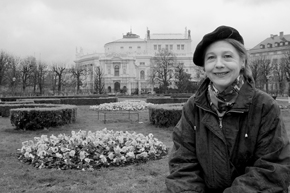Die gebürtige Wienerin absolvierte ihre Ausbildung am Max Reinhardt Seminar. 1962 wurde sie ans Wiener Burgtheater engagiert, wo sie fast 40 Jahre zum festen Ensemble gehörte. Dort debütierte sie in Raimunds "Die gefesselte Phantasie" und spielte unter anderem die Titelrolle in Anouilhs "Colombe", die “Jugend“ in Raimunds “Bauer als Millionär“, das “Mädel aus der Vorstadt“ von Nestroy, die “Miranda“ im “Sturm“ von Shakespeare, die Marie in "Der Ruf des Lebens" von Schnitzler, die “Schauspielerin“ in “Der Leibgardist“ von Ferenc Molnár und die “Anna“ in Hofmannstals „Der Unbestechliche“.
Einem breiten Publikum wurde sie durch die ORF-Produktionen „Wienerinnen“ und “Tapetenwechsel“ sowie die ORF-Serien “Ringstraßenpalais“ und "Kaisermühlen Blues" bekannt. Mit Reinhard Schwabenitzky drehte sie unter anderem die Kinofilme "Ilona und Kurti", "Hannah", "Zwei Väter einer Tochter" und "Frechheit siegt".
Neben Gastspielen an anderen Wiener Bühnen sowie in Münster, Bregenz und bei den Salzburger und Bregenzer Festspielen sowie anderen Festivals, war sie zuletzt in der Rolle der Erzherzogin Sophie an der Bühne Baden, als Mrs. Higgins in My Fair Lady am Landestheater Bregenz und den Vereinigten Bühnen Bozen sowie als Lily in „Sechs Tanzstunden in sechs Wochen“ an der Komödie am Kai in Wien zu sehen.
Juni 2012
Weiteres Informationsmaterial zu Helma Gautier schicken wir Ihnen auf Anfrage gerne zu.
|


